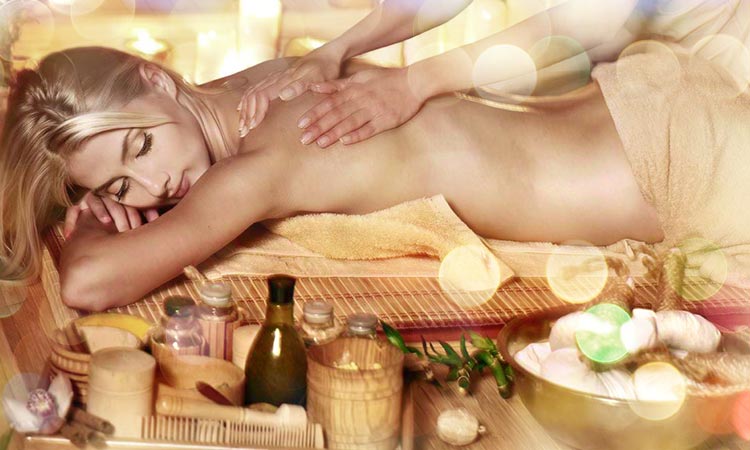Have you ever walked out of your favorite spa wishing you could feel the way you feel when you step out a spa every day? There were no “spas” in ancient India, when Ayurveda was revealed to the Rishis (sages), because these Rishis discovered how to make every day feel like spa day with the sacred ritual of Abhyanga (self-massage).
Though many may associate the word “Ayurveda” merely with expensive spa treatments, Ayurveda is actually a complete medical science of life, with “Ayurveda” deriving from the Sanskrit terms “Ayush,” meaning “life” and “Veda,” meaning “knowledge.”
From managing difficult diseases like IBS to home remedies, to psychology, to seasonal, dietary and lifestyle recommendations that prevent diseases, to assistance in attaining spiritual enlightenment, Ayurveda truly offers holistic solutions at every level: body, mind and soul.
Svasthavritta: Awakening Health Through Self-Care
Svasthavritta is a sub-branch of Ayurveda that specializes in health consciousness, including many rejuvenating, spa-like self-care practices to help people activate health and prevent disease. I feel so grateful I have learned Svasthavritta practices at Vedika Global (my Ayurveda school). It is now a joy to teach Svasthavritta practices to beginner Ayurveda students at Vedika. One of the first Svasthavritta practices I teach as part of dinacharya (Ayurveda’s recommended daily routine) is that of self-massage.
The Ayurvedic self-massage is called "Abhyanga," a beautiful Sanskrit word consisting of the terms "Aba," meaning "glow" and "Anga," meaning "limbs." Abhyanga brings a glow to our skin, reflecting the ever-glowing, shining nature of our indwelling spirits.
The Benefits of Abhyanga
Chapter Two, Verses 8-9 of an ancient Ayurvedic medical text named Ashtanga Hrdaya Sutrasthana reveals:
"The advantages of the oil massage are that it wards off old age symptoms and exertion, bestows good vision, provides nourishment to the body, equips one with a long life, good sleep and healthy skin."
Doing Abhyanga daily also balances what is known as Vata Dosha in Ayurveda. Vata Dosha is a state of matter made up of air and ether elements, which go out of balance in us whenever we don’t sleep enough, skip meals, feel stress, exercise excessively or travel too much. By soothing Vata Dosha, Abhyanga also calms the mind.
Since I have been doing Abhyanga, my complexion has cleared up, my joints crack less and I feel much more grounding, strength, composure and stability. When I was a teenager, people used to ask if I was in my 20s. Now that I am in my 20s, people ask if I am a teenager. I truly feel like my own bathroom has become like a magical spa, and my oil supply like a fountain of youth I have been fortunate to discover while still in my youth.
How To Do Abhyanga
- Buy organic Sesame and/or Coconut oil from a health food store. Sesame oil is best in winter and spring and Coconut oil in the summer and fall.
- Pour the oil into a small bowl, which can be placed inside a pot of boiling water to warm it. (You can also warm up the oil in a Crock pot.)
- Once the oil is warm, sit on a towel and start rubbing oil onto the bottoms of your feet.
- Work your way up, oiling your entire body (except the face).
- When oiling longer bones, move up and down. When oiling joints, rub in a circular motion.
- Spend time oiling each body part, giving extra attention to areas particularly prone to pain and cracking.
- Take a shower with warm to hot water, which will allow your body to more fully absorb the oil.
- Instead of using regular soap, which dries the skin, grind green mung lentils into flour in a blender and use this instead to scrub your body.
When To Do Abhyanga
• On an empty stomach
• After you eliminate your bowels in the morning
• Before you eat dinner
Abhyanga Contraindications
• No Abhyganga when unwell (active fever, flu, cold, cough, etc.)
• Do not do when menstruating
• Avoid when cloudy or raining
If none of the above contraindications apply, Abhyanga will greatly help with osteoporosis and other bodily aches and pains. In Sanskrit, another term for oiling is "Sneha," which also means "to love." Most of us love to receive love, but this desire can often lead to feeling unloved by others. One of the most powerful lessons I have learned from Ayurveda is to not wish so much to be in love or to receive love, but to actually be love itself.
Being love begins with loving ourselves, and Abhyanga is one of the best ways I’ve learned to do that. Start practicing self-love today with Abhyanga and you, too, will start to feel like every day is a spa day with Ayurveda.


